

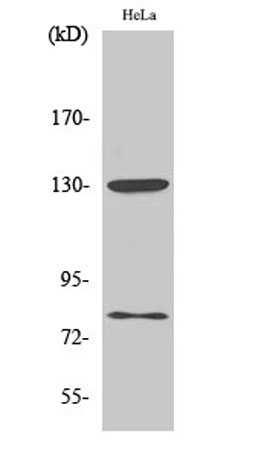
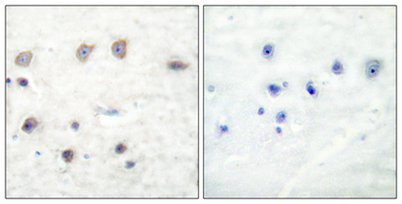
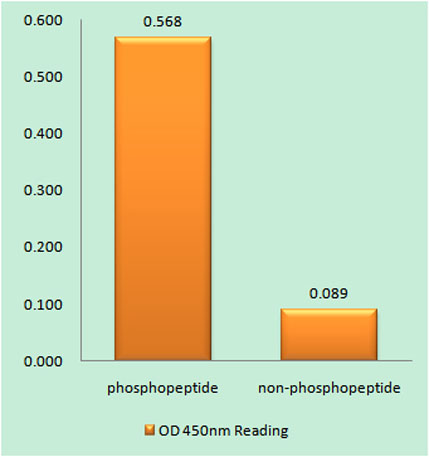
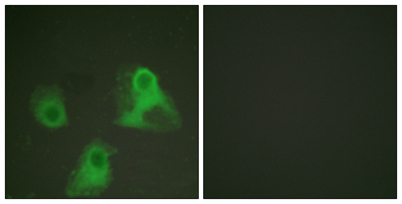
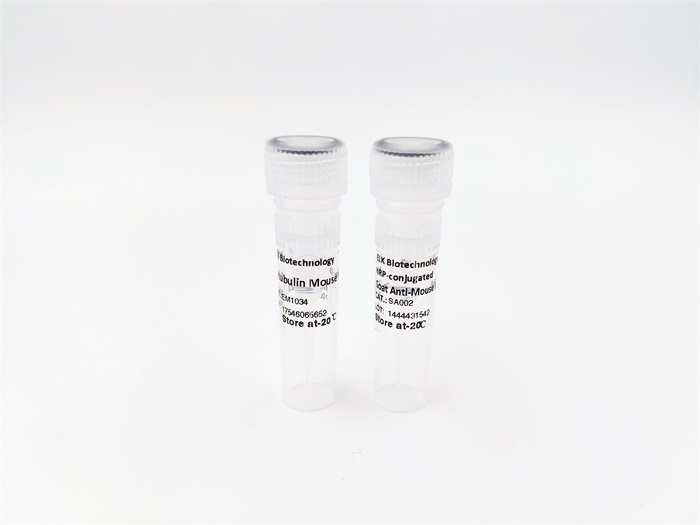



Adducin α/β (phospho Ser726/713) rabbit pAb
 One-click to copy product information
One-click to copy product information$148.00/50µL $248.00/100µL
| 50 µL | $148.00 |
| 100 µL | $248.00 |
Overview
| Product name: | Adducin α/β (phospho Ser726/713) rabbit pAb |
| Reactivity: | Human;Mouse;Rat |
| Alternative Names: | ADD1; ADDA; Alpha-adducin; Erythrocyte adducin subunit alpha; ADD2; ADDB; Beta-adducin; Erythrocyte adducin subunit beta |
| Source: | Rabbit |
| Dilutions: | Western Blot: 1/500 - 1/2000. Immunohistochemistry: 1/100 - 1/300. Immunofluorescence: 1/200 - 1/1000. ELISA: 1/40000. Not yet tested in other applications. |
| Immunogen: | The antiserum was produced against synthesized peptide derived from human ADD1 around the phosphorylation site of Ser726. AA range:688-737 |
| Storage: | -20°C/1 year |
| Clonality: | Polyclonal |
| Isotype: | IgG |
| Concentration: | 1 mg/ml |
| Observed Band: | 80kD |
| GeneID: | 118/119 |
| Human Swiss-Prot No: | P35611/P35612 |
| Cellular localization: | Cytoplasm, cytoskeleton. Cell membrane; Peripheral membrane protein; Cytoplasmic side. |
| Background: | adducin 1(ADD1) Homo sapiens Adducins are a family of cytoskeleton proteins encoded by three genes (alpha, beta, gamma). Adducin is a heterodimeric protein that consists of related subunits, which are produced from distinct genes but share a similar structure. Alpha- and beta-adducin include a protease-resistant N-terminal region and a protease-sensitive, hydrophilic C-terminal region. Alpha- and gamma-adducins are ubiquitously expressed. In contrast, beta-adducin is expressed at high levels in brain and hematopoietic tissues. Adducin binds with high affinity to Ca(2+)/calmodulin and is a substrate for protein kinases A and C. Alternative splicing results in multiple variants encoding distinct isoforms; however, not all variants have been fully described. [provided by RefSeq, Jul 2008], |
-
 Western Blot analysis of various cells using Phospho-Adducin α/β (S726/713) Polyclonal Antibody diluted at 1:1000
Western Blot analysis of various cells using Phospho-Adducin α/β (S726/713) Polyclonal Antibody diluted at 1:1000 -
 Immunohistochemical analysis of paraffin-embedded Human breast cancer. Antibody was diluted at 1:100(4° overnight). High-pressure and temperature Tris-EDTA,pH8.0 was used for antigen retrieval. Negetive contrl (right) obtaned from antibody was pre-absor
Immunohistochemical analysis of paraffin-embedded Human breast cancer. Antibody was diluted at 1:100(4° overnight). High-pressure and temperature Tris-EDTA,pH8.0 was used for antigen retrieval. Negetive contrl (right) obtaned from antibody was pre-absor -
 Enzyme-Linked Immunosorbent Assay (Phospho-ELISA) for Immunogen Phosphopeptide (Phospho-left) and Non-Phosphopeptide (Phospho-right), using ADD1 (Phospho-Ser726) Antibody
Enzyme-Linked Immunosorbent Assay (Phospho-ELISA) for Immunogen Phosphopeptide (Phospho-left) and Non-Phosphopeptide (Phospho-right), using ADD1 (Phospho-Ser726) Antibody -
 Immunofluorescence analysis of HeLa cells, using ADD1 (Phospho-Ser726) Antibody. The picture on the right is blocked with the phospho peptide.
Immunofluorescence analysis of HeLa cells, using ADD1 (Phospho-Ser726) Antibody. The picture on the right is blocked with the phospho peptide.

 Manual
Manual